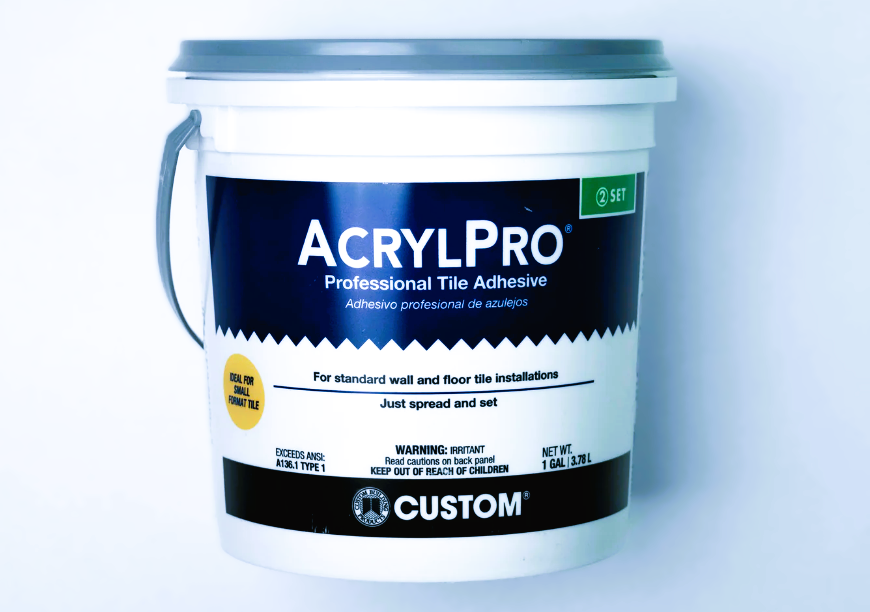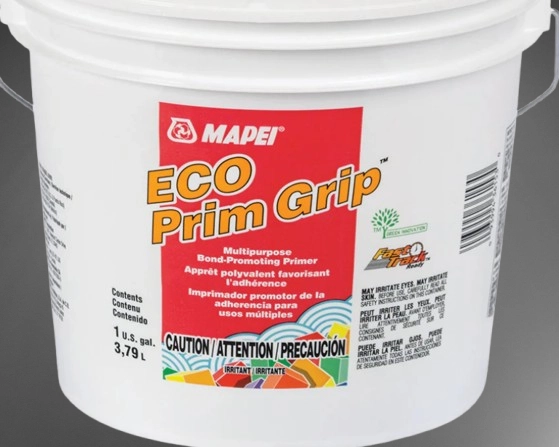Why AcrylPro Tile Adhesive Isn't Drying

Because of its special formula and unparalleled bonding power, AcrylPro tile adhesive is the most popular choice among professional and do-it-yourself tilers. But that’s not all.
This tile glue from Custom Building Products may be used to join a variety of tiles, including small format and stone, and it resists sagging.
Additionally, it can be applied to locations that have sporadic water exposure. Applying it is quite simple. AcrylPro tile glue occasionally fails to dry, though.
I’ll be exploring the causes of this in this post and offering expert fixes for AcrylPro glue that isn’t drying.
How much time does it take for AcrylPro Tile Adhesive to dry?
AcrylPro tile glue cures in 24 to 72 hours, according to the maker, Custom Building Products.
They add that if AcrylPro is used to lay larger tiles, the humidity is excessive, or the temperature is below 15 degrees Celsius, the drying time may be prolonged.
Don’t assume that your AcrylPro tile glue isn’t dried just yet. You must become acquainted with the anticipated cure time.
You can determine that there is an issue if, after three days, the AcrylPro you used to lay the tiles is still not drying.
Why Does AcrylPro Tile Adhesive Failure Occur?
There are a number of reasons why AcrylPro tile glue can not dry. Among them are
-
Applying AcrylPro to Tiles Larger Than the Suggested 8×8 Size
At Build It Fine, we always advise our readers to utilize every product according to the manufacturer’s instructions.
Tiles that are 8 by 8 or less should utilize this glue, according to Custom Building Products. There is a significant potential that it will take longer to dry or not dry at all if you use it on tiles that are larger than what is advised.
The Fix: Look for an adhesive designed especially for larger tiles if you’re working with them.
-
AcrylPro’s Use on Non-Porous Surfaces
The AcrylPro maker also states in their data sheet that non-porous surfaces, including vinyl floors or water membranes, should never be coated with this glue.
A non-porous surface hinders the adhesive’s ability to adhere and prevents it from drying.
The Fix: AcrylPro should only be applied on authorized porous substrates.
-
Using AcrylPro on Top of Wet Substrates
The AcrylPro tile adhesive’s drying time may be extended if there is moisture on the substrate. When there is too much water present, the AcrylPro might not dry entirely.
The Fix: Before using the AcrylPro tile glue, make sure the substrate is completely dry.
-
Using the adhesive in thicker coats
Some people believe that a stronger binding will be ensured by using thicker layers of AcrylPro. On the other hand, it frequently causes problems like making it impossible for it to dry correctly and promptly.
The Fix: Please only use thin layers of AcrylPro.
-
Using outdated or out-of-date AcrylPro
The shelf life of AcrylPro ceramic tile glue is 18 months. if the shelf life shown above has passed and you have some stashed.
When using it, you could experience problems like it not drying even in the ideal circumstances. AcrylPro has an expiration date, just like any other construction product, and some of its essential qualities are lost after it.
The Fix: Throw away any AcrylPro bags that have gone bad and get fresh ones instead.
-
Neglecting to combine the adhesive prior to application
Even though AcrylPro is a premixed tile adhesive, you shouldn’t open the container and begin applying it immediately.
Certain components in AcrylPro sink to the bottom when stored. Therefore, if you apply it directly, the top layer won’t have the necessary components that could interfere with the curing process.
The Fix: To be safe, always completely mix the adhesive before using.
-
Applying It to Inappropriate Substrates
However, the datasheet for Custom Building Products lists a few substrates on which AcrylPro should not be used.
Particle board, hardwood, OSB, fiberglass, and vinyl flooring are a few examples. There is a greater chance of failure when using AcrylPro on these substrates, which could prevent it from drying.
The answer is to carefully review the list of substrates that AcrylPro is approved to be used on.
-
Applying Too Much Weight or Pressure on New Adhesive
You risk interfering with the drying process of freshly placed AcrylPro tile glue if you set heavy objects on top of it or apply excessive pressure.
The Fix: For at least three days, freshly applied glue should be left undisturbed.
-
If there are chemicals, dust, or dirt on the substrate
AcrylPro can react with any foreign material on the substrate, which could impact the drying process. Among these are chemicals, dust, grime, and even another kind of glue.
The Fix: The surface of a substrate that’s about to be coated with this adhesive needs to be cleaned properly.
If AcrylPro Tile Adhesive isn’t drying, what can I do?
This problem can be approached in two ways:
1. Adjust the Conditions: If the reason your AcrylPro tile glue isn’t drying is due to humidity or temperature.
By using a heater to raise the temperature or opening the ventilation, you can change these conditions. The drying process should be accelerated as a result.
2. Start Over: I hate to be the one to break the terrible news, but you will have to start over if the first two options don’t work.
You are forced to start over if you have committed any of the aforementioned errors, such as utilizing larger tiles or applying on a wet or non-porous surface.
You’ll know what to do and what not to do this time. The AcrylPro tile adhesive will therefore dry in two to three days, and you can be absolutely certain of that.
How Do You Determine Whether AcrylPro Tile Adhesive Is Drying?
In most cases, a visual examination is sufficient to identify non-drying AcrylPro tile glue. It is not quite dry if it still seems hazy or milky. In addition, the glue hasn’t cured if you touch it and it’s still tacky.
If you want to be extra sure that the adhesive is still wet, you can run a finger over it and see if it removes any residue.
Please be aware that these tests ought to be conducted as soon as day four following application.
If AcrylPro Adhesive dries too quickly, is that okay?
It’s also a good idea to look at both sides of this topic before I finish my guide. So, to address the above, it’s not appropriate for AcrylPro adhesive to dry very quickly.
If that happens, the bond established may be weak and the tiles can slip off prematurely. If the climate is too conducive, AcrylPro may dry too soon. In other words, the temperature is high and the humidity is quite low.
Please think about applying a retarder, a chemical that slows down the drying time of AcrylPro tile glue, if you find yourself in such a situation.
Every glue must cure within the suggested time limit. It’s a concern if it proceeds too slowly. And if it dries too soon, the same thing might be said.

